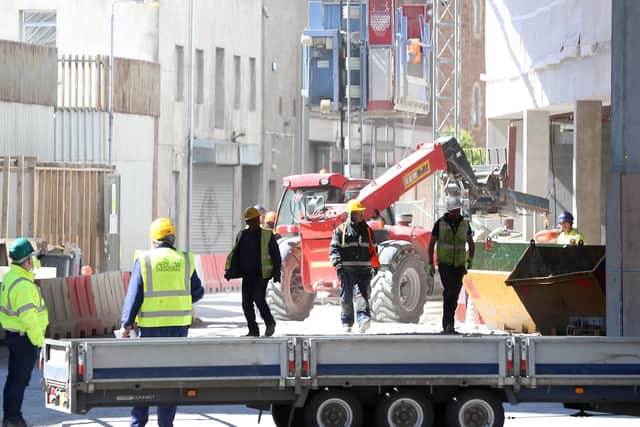‘Calamitous impact’ of red diesel ban on firms already under strain
and live on Freeview channel 276
Effective from yesterday, red diesel will only be permissible for agriculture, rail transport and non-commercial heating.
The switch to ‘white’ diesel could cost the construction and manufacturing industries millions of pounds every year.
Advertisement
Hide AdAdvertisement
Hide AdAmong those hardest hit will be contractors reliant on large mobile generators used for construction and quarrying.


The ending of the government rebate on red diesel is one element of the UK’s strategy to reduce carbon emissions and improve air quality. However, those opposed to the new legislation have argued it will do nothing to improve air quality as low carbon alternatives are not yet available.
Mark Spence of the Construction Employers Federation said: “The scale of rising costs in general, energy in particular, will be exacerbated by the looming rebate removal, and all on the pretext of carbon reduction, which this policy change will do nothing to achieve in the short term.”
In a direct question to Construction Minister Lee Rowly MP, Mr Spence asked if he appreciated the “calamitous impact the rebate removal would have on SME (small and medium-sized enterprises) businesses in Northern Ireland?”
Advertisement
Hide AdAdvertisement
Hide AdSpeaking ahead of the law change, Colin Emerson of the Norman Emerson Group, which employs around 100 people at two concrete processing plants in Co Armagh, said he believes it will cost his own business up to £500,000 a year.


“I see a big, big hit on the construction industry in the next year or two,” he told the BBC.
Another major concern to emerge is the potential for thieves, seeking to steal sizeable quantities of road legal fuel, to target machinery left on building sites.
Industry professionals have been liaising with police as the potential damage to vehicle fuel tanks each time could cost thousands to repair.
Advertisement
Hide AdAdvertisement
Hide AdMr Spence of the CEF said the UK Construction Minister assured him he would relay his concerns to Treasury.
“The minister said he understood the pressures on business but he held the Treasury line that the industry had been on notice for some years about the coming change and had to take the necessary steps to mitigate the costs and reduce carbon consumption.
“He did however undertake to feed back to his colleagues in Treasury and encouraged Northern Ireland MPs to continue to raise the matter in Westminster,” Mr Spence said.
DUP MP Carla Lockhart has raised the same concerns on the floor of the Commons, said the government “will come to regret the decision” as the economic impact becomes clear.
Advertisement
Hide AdAdvertisement
Hide AdAs the law change became effective, she said: “This decision will drive up the cost of construction, with an increase in house prices inevitable making it harder to take that first step on the housing ladder.
“Furthermore, it will make the construction of new hospitals, new schools, and new roads more expensive to the public purse. For our waste management sector, recycling will become more expensive and that is likely to be channelled back to local councils and the ratepayer. In practical terms, it leaves the small construction firms that share machinery with a farm business in an impossible situation, resulting in a forced switch to the more expensive white diesel for all machines.”
Sinn Fein economy spokesperson Caoimhe Archibald has also called on the government to reverse the changes.
“These changes will hit businesses in construction, quarrying and manufacturing which are already struggling with increased costs of materials and soaring energy prices and it will put jobs at risk.
Advertisement
Hide AdAdvertisement
Hide Ad“This change to the entitlement to use red diesel won’t reduce emissions but it will however increase revenues for the British Treasury, at a time when the Treasury is already benefiting from increased VAT receipts of rising costs,” she said.
The cost of both white and red diesel has risen dramatically in recent weeks, with red costing around 90p + VAT per litre, compared to around £1.77 per litre for white.
In what it called its “manifesto” ahead of the NI Assembly elections next month, the Construction Employers Federation published the results of an industry survey that showed widespread financial hardship being experienced – even before the switch to the more expensive diesel.
The CEF said the results show that “critical” rising costs were placing 27% of businesses at risk of closure, with more than half reporting their goal for this year was to stabilise... or just survive.
Advertisement
Hide AdAdvertisement
Hide Ad——— ———
A message from the Editor:
Thank you for reading this story on our website. While I have your attention, I also have an important request to make of you.
With the coronavirus lockdowns having had a major impact on many of our advertisers — and consequently the revenue we receive — we are more reliant than ever on you taking out a digital subscription.
Subscribe to newsletter.co.uk and enjoy unlimited access to the best Northern Ireland and UK news and information online and on our app. With a digital subscription, you can read more than 5 articles, see fewer ads, enjoy faster load times, and get access to exclusive newsletters and content.
Advertisement
Hide AdAdvertisement
Hide AdVisit https://www.newsletter.co.uk/subscriptionsnow to sign up.
Our journalism costs money and we rely on advertising, print and digital revenues to help to support them. By supporting us, we are able to support you in providing trusted, fact-checked content for this website.
Ben Lowry, Editor